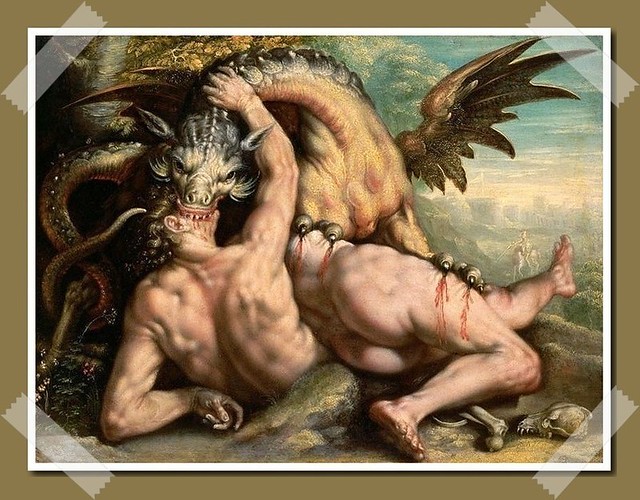Cadmus

Cadmus (spear, shield) In Greek mythology, culture hero, king of Thebes; son of Agenor of Phoenicia and Argiore (or Telephassa); brother of Cilix, Electra, Demodoce, Phineus, Thasus, Europa, and Phoenix; married Harmonia; father of Agave, Autonoe, Illyrius, Ino, Polydorus, and Semele. Cadmus’s sister Europa was carried off and raped by Zeus. Cadmus and his brothers Phoenix and Cilix were sent out with the command to find Europa. They were forbidden to return to Phoenicia without their sister.
In the course of their wanderings they arrived in Thrace, where Cadmus’s mother, who had accompanied him so far, died. Cadmus then asked the Delphic oracle what he should do. He was told to cease his search for Europa and follow a certain cow and to establish a city on the spot where the cow would lie down. The cow met Cadmus in Phocis and led him to the site that was to become Boeotia. Cadmus wanted to sacrifice the cow to Athena, so he sent his companions to a nearby spring to bring water for the rites. The spring was guarded by a dragon-serpent, the offspring of Ares and the Erinys Tilphosa.
When the men did not return in a short time, Cadmus went in search of them. He found the dragon-serpent feeding on their flesh, and he killed the monster. (Medieval European paintings show the beast with wings.) Athena then advised Cadmus to sow the teeth of the dragon like seeds. He did so, and immediately a crop of armed warriors sprang up. Cadmus then flung a stone into their midst. A battle broke out, and all but five of the men killed each other. The five were called Spartoi (sown men). They were Echion (snake man), Udaeus (ground man), Chthonius (earth man), Hyperenor (superman or overbearing), and Pelorus (monster).
The price Cadmus had to pay for killing the dragon of Ares was to serve the god for an “eternal” year—about eight years, the period of banishment for a homicide. Afterward Athena made him ruler of Thebes. Zeus gave Harmonia, the daughter of Aphrodite and Ares, to Cadmus as his wife. Cadmus gave Harmonia an outer robe or cloak and a necklace made by the craft god Hephaestus.
As further punishment for killing Ares’ dragon-serpent, many of the children of Cadmus and Harmonia died. Childless, the couple left Thebes and settled in the country of the Enchelians. The people received them kindly, making Cadmus their king. One day Cadmus said,
“If a serpent’s life is so dear to the gods, I would I were myself a serpent.”
No sooner had Cadmus uttered the words than he began to change into a snake. When Harmonia saw him, she asked the gods to grant her the same. The two became serpents. When they died, they went to Elysium. Later Greek mythology credits Cadmus with the invention of the Greek alphabet and
the art of mining and with the introduction of the worship of Dionysus. Lord Byron refers to the belief that Cadmus invented the alphabet:
You have the letters Cadmus gave Think you he meant them for a slave?
In Paradise Lost (book 9.503–506) Milton refers to the changing of Cadmus and Harmonia into serpents:
. . . pleasing was his shape, And lovely: never since of serpent kind Lovelier; not those that in Illyria changed Hermione and Cadmus. . . .
(Milton confused Hermione with Harmonia.) Matthew Arnold’s play Empedocles on Aetna refers to Harmonia and Cadmus’s tale:
. . . Two bright and aged snakes Who once were Cadmus and Harmonia, Back in the glens or on the warm sea shore, In breathless quiet after all their ills.
Ovid’s Metamorphoses (book 3), Chaucer’s Knight’s Tale, and Alexander Pope’s Thebais all refer to the myth.
SOURCE:
Encyclopedia of World Mythology and Legend, Third Edition – Written by Anthony S. Mercatante & James R. Dow
Copyright © 2009 by Anthony S. Mercatante